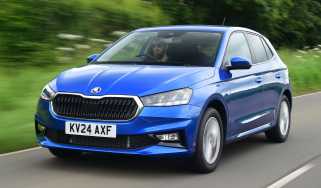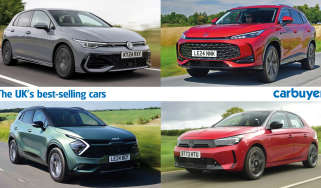Top 10 best cheap cars to insure
Whether you’re after a supermini or an SUV, here’s our list of the best cars with low insurance premiums
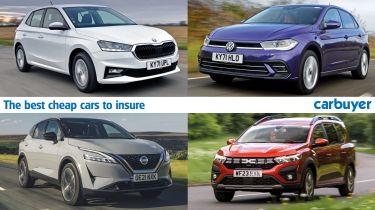
From annual services, to tyre changes and filling up with fuel, the costs of running a car can quickly accumulate, and an expensive insurance premium only adds to the lengthy list of bills. It’s not uncommon for younger and lesser-experienced drivers to hand over four-figure sums for a year of comprehensive car insurance, so it's important to know which cars will be the cheapest to insure.
Although many factors come into play when calculating your insurance, buying a car in a low insurance group is one of the best ways to cut the cost of your annual premium. Every car on sale in the UK is categorised into a group from one to 50, with 50 being the most expensive to insure. When deciding which group a car belongs to, insurers consider many things, from the purchase price of the car, to the power output and its likelihood of being stolen. Generally, cheaper new cars will cost less to insure, but it’s not a hard and fast rule and it’s always worth asking for an insurance quote before making any purchase.
Electric cars are currently some of the most advanced and powerful cars on the market, and this means many can cost more to insure than a petrol or diesel equivalent. While all the cars on this list are powered by traditional combustion engines, there are some electric cars that offer cheap car insurance, such as the electric Fiat 500, if you’re set on battery-power.
 The 10 cheapest electric cars you can buy today
The 10 cheapest electric cars you can buy today
Our list of the best cheap cars to insure takes into account a variety of models that aren’t merely the cheapest to insure, but also have other attributes that make them some of the best to buy. We’ve separated them into four categories – small cars, family cars, SUVs and seven-seater cars – so there should be a cheap-to-insure car to suit your needs.
There are, of course, many more factors that come into play when calculating your insurance premium, such as installing a 'black box' in your car, so you should also look at our guide to getting cheaper car insurance to make sure you’re getting the best deal possible. You’ll find our top 10 articles for the best first cars and most economical cars useful for keeping motoring costs down.
Small Cars
Small cars tend to have cheaper price tags and low-powered engines, often making them the cheapest to insure – here are our top picks.
1. Skoda Fabia
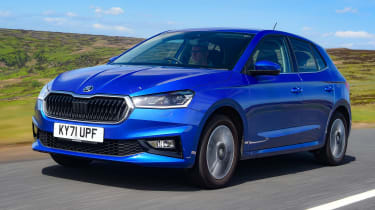
Not only is the Skoda Fabia a great all-round hatchback, deservedly winning our 2024 Best Small Car award, but it’s cheap to insure too, with the entry-level SE Comfort model sitting in group 4.
This version’s 74bhp 1.0-litre MPI engine may feel lacklustre on occasion, but as an urban runabout it’s perfectly adequate. Upgrading to the more powerful 1.0-litre TSI engine provides the Fabia with enough pulling power for easy overtaking, but it takes the hatchback into insurance group 10 – more expensive, but certainly still at the affordable end of the scale.
Inside, the Fabia is well-equipped with excellent space for both front and rear passengers. Impressive fuel economy, an affordable purchase price and a five-star NCAP crash-test rating add to the Fabia’s appeal, making it a great choice for younger and newly-qualified drivers.
2. Volkswagen Polo
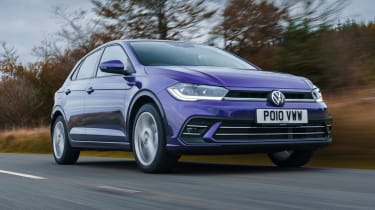
The Volkswagen Polo is perhaps the most well-recognised name in the supermini segment, now that the Ford Fiesta is no longer in production. Its popularity with younger and less experienced drivers is well justified – the Polo is one of only two new cars on sale that sit in insurance group one.
This makes the Polo one of the cheapest cars to insure in the UK, and it therefore earns a spot on this list. The German hatchback is more than just an insurance bargain, though; its spacious interior, sophisticated equipment and a refined driving experience add up to create an excellent small car.
Sharing its platform with the Skoda Fabia, the Polo impressed us during testing, with a comfortable ride and high-quality interior. Of particular note was the digital driver’s display which is fitted as standard to all new Polos. Only the entry-level ‘Life’ model qualifies for insurance group one, fitted with the same 1.0-litre MPI engine as the Fabia. It’s certainly not quick, but with ample power for around town, it will do the job for most new drivers. As with the Fabia, there’s the option to upgrade to the pokier 1.0-litre TSI engine, which sits in insurance group eight.
Whilst we think the Skoda Fabia is the better of the two cars, the Volkswagen Polo is an excellent option if you must have the lowest insurance group possible.
3. Kia Picanto
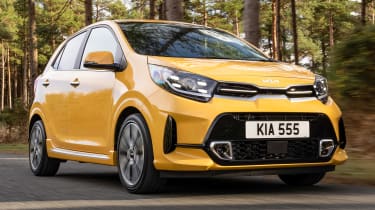
The second of the two cars on sale that sit in insurance group one, the Kia Picanto is not only one of the most affordable new cars to buy, but it's also one of the cheapest to insure.
Strangely, while the cheapest Picanto starts from under £14,000, this model actually sits in insurance group five – only the Picanto in mid-spec ‘2’ trim fitted with the automatic gearbox sits in insurance group one. Opting for the higher-spec ‘GT-Line’ trim only bumps the Picanto into insurance group two, and brings the ‘forward collision-avoidance system’ that insurers value, along with air-conditioning.
Aside from the top-of-the-range ‘S’ models, all Picantos are fitted with a 1.0-litre engine producing 66bhp – more than enough for keeping up with city traffic. Whichever model you choose, the Picanto provides excellent budget-friendly motoring – even the base model gets Bluetooth for music streaming. Alongside the affordable insurance renewal prices, the Picanto comes with Kia’s seven-year warranty for peace of mind.
Family cars
Need something with more space than a supermini? Don’t worry – there are plenty of cars with space for all the family that won’t cost a fortune to insure.
1. Skoda Octavia
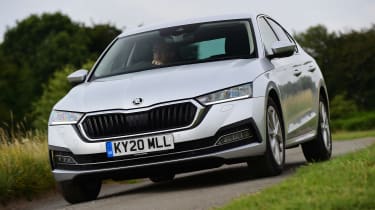
The Skoda Octavia has been a family-favourite hatchback for 25 years and the latest model is no exception. Not only is it cheaper to buy than many of its rivals, but it sits in insurance group 13, which means that it's affordable to insure too.
The Octavia boasts class-leading interior space, handsome looks and a quiet and comfortable ride, offering everything that most families need from a new car. The entry-level SE model with the 1.0-litre TSI engine and manual gearbox slots neatly into insurance group 13, on par with practically all of its rivals (opt for the automatic and you’ll only be bumped up into group 14).
2. Hyundai i30
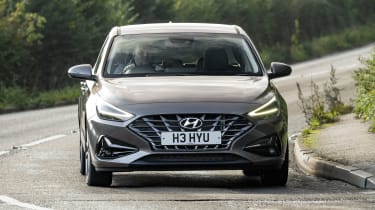
Hyundai is now one of the most popular brands in the family car segment, with electric models such as the Ioniq 5 and Kona proving big sellers in the UK. However, buyers looking for the best insurance deal should opt for the more traditional Hyundai i30 hatchback, the entry-level ‘SE Connect’ model sitting in group 10.
Besides its affordable insurance, there’s plenty to love about the i30. Families will appreciate its long list of standard safety equipment, as well as its excellent composure on the motorway. For the lowest insurance premium, you’ll need to pick the entry-level 1.0-litre three-cylinder engine, but even this has plenty of grunt for everyday driving. An official fuel efficiency figure of just over 54mpg helps to keep running costs low, and Hyundai’s five year, unlimited-mileage warranty provides good peace of mind.
Upgrading to the ‘Premium’ specification nudges the i30 up into insurance group 11, but brings a host of extra interior kit, such as a larger 10.25-inch infotainment display. The Skoda Octavia may be the better all-round family car, but the Hyundai i30’s lower insurance group could be the deciding factor for buyers on a budget.
3. Kia Stonic
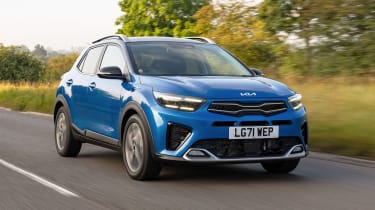
Kia’s budget-friendly family SUV, the Stonic, sits in a hotly-contested segment. Whilst it may be overlooked in favour of newer rivals, such as the Nissan Juke and Hyundai Bayon, it remains one of the cheapest to insure, with some models sitting in insurance group eight.
Facelifted in 2020, the Stonic looks sharp on the outside, and has a functional and well-equipped interior on the inside. With Apple CarPlay and Android Auto fitted as standard, along with a host of safety features, the Stonic should have all the kit that families need.
The 1.0-litre petrol engine is quiet and responsive, and buyers will be pleased with either the six-speed manual or the seven-speed automatic gearbox. Newer rivals may be more practical and may feature more advanced interior tech, but the Stonic is still a reliable option for families looking for the lowest insurance premium.
SUVs
Many SUVs come with higher price tags in comparison to their hatchback counterparts, often resulting in heftier insurance premiums. However, that isn’t always the case, and the two cars in this category prove that running an SUV doesn’t have to break the bank.
1. Nissan Qashqai
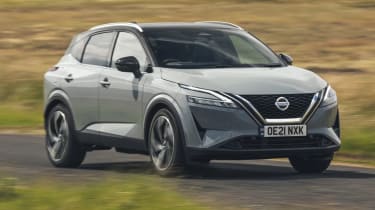
As one of the UK’s best-selling cars, the Nissan Qashqai is likely to be near the top of any SUV-shopper’s list. With great practicality and a stylish interior, its low insurance group of 11 only serves to make the Qashqai an even more compelling choice.
The entry-level ‘Visia’ model will provide the lowest insurance premiums, although stepping up to higher trim levels only bumps the Qashqai up a few groups. This model comes with the 1.3-litre mild-hybrid engine, good for 138bhp. It’s comfortable, efficient, and quiet at motorway speeds, all adding up to create an excellent driving experience. With one of the lowest insurance groups in its class, what’s not to like?
2. SEAT Ateca
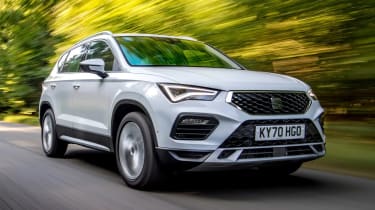
If you’re after an SUV with sharp looks, great driving dynamics and affordable insurance, the Seat Ateca is an option worth considering.
While most Ateca models sit within insurance groups 18 or 19, the entry-level model provides the best money-saving opportunity, falling into group 10. This ‘SE’ model features the same 1.0-litre three-cylinder petrol engine found in the aforementioned Volkswagen Polo and Skoda Fabia, producing 110bhp in this application. It’s both quiet and smooth, and has performance beyond what you’d typically expect from such a small engine.
Combined with a handsome and ergonomic interior, and a larger boot than the Renault Kadjar and Ford Kuga, the Ateca provides all the SUV benefits without the usual, chunky insurance premium.
Seven-seater cars
Those with big families, or with lots of luggage to haul, may assume that they’re out of luck when it comes to cheap-to-insure cars. However, bigger doesn’t necessarily mean more expensive, as these seven-seaters sit in some of the lowest insurance groups.
1. Volkswagen Caddy
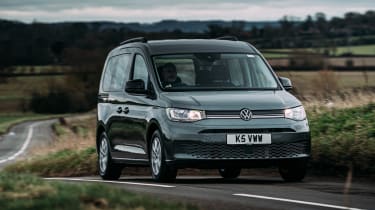
Despite costing more than a Volkswagen Golf, the larger, van-based Volkswagen Caddy is actually cheaper to insure. Both the entry-level Caddy and the higher-spec ‘California’ model sit within insurance group eight, much lower than any seven-seater SUV.
Its boxy body brings excellent practicality – there’s sliding doors to make getting in and out of the back seats easier, and the boot is enormous. However, the Caddy belies its van-based origins in terms of driving experience, feeling closer to a Golf hatchback than a Transporter van. Its performance is adequate, the ride is comfortable and, although the materials are not as premium as those found in a Golf, the interior features plenty of tech and feels robust.
While most manufacturers are moving away from typical MPVs in favour of seven-seater SUVs, this often brings higher price tags and bigger insurance premiums. The Volkswagen Caddy sticks to the original MPV recipe, providing buyers with excellent practicality as well as cheap insurance.
2. Dacia Jogger
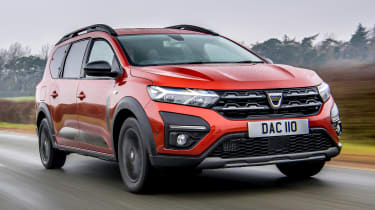
Not only is the Dacia Jogger one of the best value seven-seater cars on the market, it's also relatively affordable to insure. It offers nearly everything that a large family could need, and its low insurance group further bolsters its appeal.
With masses of interior and boot space, along with seven seats, the Dacia Jogger covers all of the basics that an MPV should. The entry-level ‘Essential’ model comes with little in the way of interior equipment, but upgrading to higher spec ‘Expression’ and ‘Extreme’ models doesn’t push the Jogger into a higher insurance group.
The Jogger is certainly no sports car, with only 108bhp on tap, but the engine is quiet and powerful enough for everyday driving. While the interior space is the star of the show, the Jogger’s starting price of just over £18,000 makes this both a practical and affordable option for families.
If you want a variety of cars that are economical to run in other ways, check out our review for the best cheap-to-run cars...
Recommended
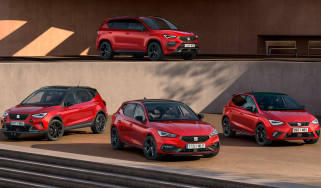
SEAT releases new Black Edition models with sportier styling
Most Popular
Tips & advice

Car dashboard warning lights: what does each symbol mean?

Electric car charging stations: public networks, charger types, apps and maps

